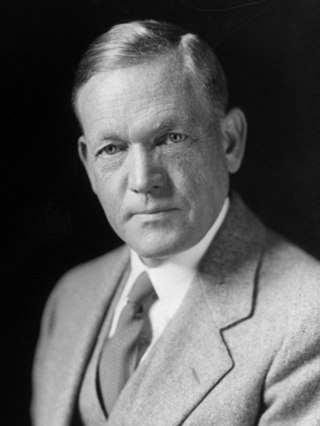
Theodore Ralph Kulongoski is an American politician, judge, and lawyer who served as the 36th Governor of Oregon from 2003 to 2011. A member of the Democratic Party, he served in both houses of the Oregon Legislative Assembly and also served as the state Insurance Commissioner. He was the Attorney General of Oregon from 1993 to 1997 and a justice of the Oregon Supreme Court from 1997 to 2001. Kulongoski has served in all three branches of the Oregon state government.

The governor of Oregon is the head of government of Oregon and serves as the commander-in-chief of the state's military forces. The title of governor was also applied to the office of Oregon's chief executive during the provisional and U.S. territorial governments.

Charles Linza McNary was an American Republican politician from Oregon. He served in the U.S. Senate from 1917 to 1944 and was Senate Minority Leader from 1933 to 1944. In the Senate, McNary helped to pass legislation that led to the construction of Bonneville Dam on the Columbia River, and worked on agricultural and forestry issues. He also supported many of the New Deal programs at the beginning of the Great Depression. Until Mark Hatfield surpassed his mark in 1993, he was Oregon's longest-serving senator.

The 1912–13 United States Senate elections were held on various dates in various states. They were the last U.S. Senate elections before the ratification of the Seventeenth Amendment in 1913, establishing direct elections for all Senate seats. Senators had been primarily chosen by state legislatures. Senators were elected over a wide range of time throughout 1912 and 1913, and a seat may have been filled months late or remained vacant due to legislative deadlock. Some states elected their senators directly even before passage of Seventeenth Amendment. Oregon pioneered direct election and experimented with different measures over several years until it succeeded in 1907. Soon after, Nebraska followed suit and laid the foundation for other states to adopt measures reflecting the people's will. By 1912, as many as 29 states elected senators either as nominees of their party's primary or in conjunction with a general election.

James Withycombe was an English-born American Republican politician who served as the 15th Governor of Oregon.

Ben Wilson Olcott was an American politician of the Republican Party who served as the 16th Governor of Oregon.

Walter Marcus Pierce was an American politician, a Democrat, who served as the 17th Governor of Oregon and a member of the United States House of Representatives from Oregon's 2nd congressional district. A native of Illinois, he served in the Oregon State Senate before the governorship, and again after leaving the U.S. House. Pierce was an anti-Catholic supporter of compulsory public education and signed a law banning parochial schools, resulting in lawsuits and the United States Supreme Court case of Pierce v. Society of Sisters. He was also a eugenicist and supported Prohibition. He advocated unsuccessfully for a state income tax and vehicle license fee.

Isaac Lee Patterson, was the 18th Governor of Oregon from 1927 to 1929. An Oregon native, he served in the Oregon Legislative Assembly from 1918 to 1922, and was a farmer in the Willamette Valley. He was the first governor of Oregon born in the state after it was admitted to the Union.

Conrad Patrick Olson was an American politician and judge in Oregon. He was the 48th justice of the Oregon Supreme Court. Additionally, the Wisconsin native served in both chambers of the Oregon Legislature during the early 1900s.

Charles A. Johns was an American lawyer, jurist and politician who served as the 47th justice of the Oregon Supreme Court. Johns also served as mayor of Baker City in Eastern Oregon and as an associate justice of the Supreme Court of the Philippines while that archipelago was under U.S. jurisdiction.

The 2010 Oregon gubernatorial election was held on Tuesday, November 2, 2010 to elect the Governor of Oregon to a four-year term beginning on January 10, 2011. The incumbent governor, Democrat Ted Kulongoski, was ineligible to run due to term limits barring him from being elected to more than two consecutive terms.

Camp Withycombe, located in Clackamas County, Oregon, United States, was originally established as Camp Benson after Governor Frank W. Benson, but was later renamed Camp Withycombe during World War I for Governor James Withycombe.

The 1922 Oregon gubernatorial election took place on November 7, 1922, to elect the governor of the U.S. state of Oregon. The election matched incumbent Republican Ben W. Olcott against Democrat Walter M. Pierce. With the support of the Ku Klux Klan, then a powerful political force in the state, Pierce won the election by a wide margin.

City View Cemetery is a privately owned cemetery in Salem, Oregon, United States, that was established in 1893. Its Mount Crest Abbey Mausoleum, opened in 1914, contains the remains of eight governors of Oregon.

The 2014 Oregon gubernatorial election was held on November 4, 2014, to elect the Governor of Oregon, concurrently with other elections in Oregon and across the United States.

The 1914 Oregon gubernatorial election took place on November 3, 1914 to elect the governor of the U.S. state of Oregon. The election matched Republican James Withycombe against Democratic candidate C. J. Smith.

The 1906 Oregon gubernatorial election took place on June 4, 1906 to elect the governor of the U.S. state of Oregon. The election matched Republican James Withycombe against incumbent Democrat George Earle Chamberlain.

The 2018 Oregon gubernatorial election was held on November 6, 2018, to elect the governor of Oregon to serve a full four-year term. In the 2016 special election, Democratic governor Kate Brown had been elected to serve the last two years of John Kitzhaber's term.

Glenn Stanton (1895–1969) was an American architect in practice in Portland, Oregon, from 1925 until 1969. From 1951 to 1953 he was president of the American Institute of Architects.





















